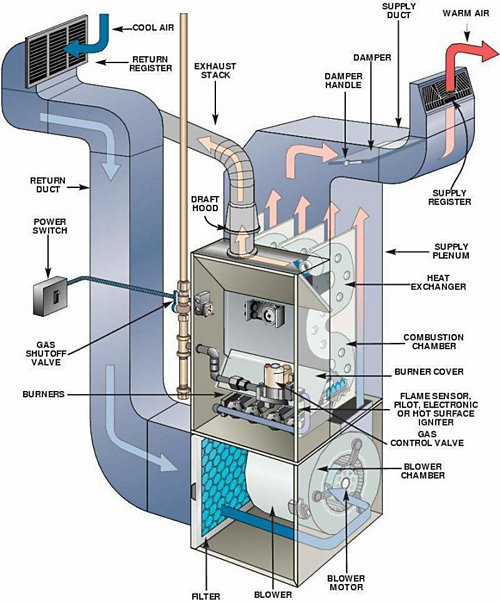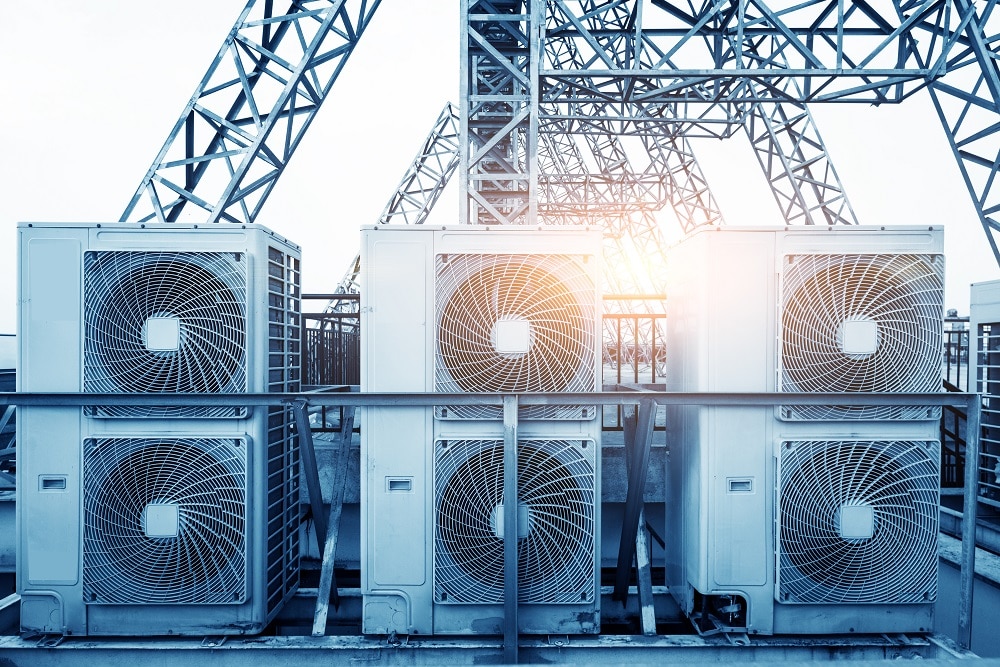Discovering the Crucial Elements of an Effective Cooling And Heating System
A reliable HVAC system is improved numerous important elements that work in harmony. Each component, from the thermostat to the ductwork, plays an important role in maintaining comfort and power efficiency. Recognizing these elements is critical for optimizing performance and improving interior air quality. As one takes a look at these parts, the detailed partnerships between them reveal understandings into boosting total system efficiency. What particular variables contribute most to this performance?
The Role of the Thermostat in Heating And Cooling Efficiency
Although frequently ignored, the thermostat plays an important role in the performance of HVAC systems. HVAC experts. This little device works as the primary nerve center, controling temperature level setups and guaranteeing perfect convenience within a space. By properly sensing the ambient temperature, the thermostat connects with the air, air flow, and heating conditioning systems to preserve the preferred environment
An efficient thermostat reduces energy usage by turning on the HVAC system only when necessary, thus stopping excessive home heating or cooling. Modern clever and programmable thermostats boost this performance further by allowing users to establish timetables and remotely adjust settings, adapting to daily routines.
In addition, the positioning of the thermostat is essential; improper area can bring about imprecise temperature level analyses, resulting in inefficient operation. In general, a well-functioning thermostat not only improves comfort but additionally adds substantially to power cost savings and the longevity of the cooling and heating system.
Recognizing the Value of Air Filters
Air filters serve an essential feature in heating and cooling systems by guaranteeing that the air distributing within a space stays healthy and tidy. These filters trap dirt, allergens, and various other contaminants, preventing them from being recirculated throughout the setting. By capturing these particles, air filters add to enhanced indoor air high quality, which can greatly profit residents' wellness, especially those with allergic reactions or breathing problems.
Furthermore, keeping clean air filters boosts the efficiency of cooling and heating systems. Stopped up filters can limit air flow, causing the system to function harder to keep desired temperature levels, leading to boosted power consumption and greater utility costs. Frequently changing or cleaning filters is a crucial maintenance action that can prolong the life expectancy of a/c equipment. Inevitably, understanding the significance of air filters permits homeowners and building managers to take positive actions to guarantee a well-functioning, efficient heating and cooling system that advertises a secure and comfy indoor setting.

The Performance of the Furnace and Heatpump
Heaters and heat pumps are critical parts of a/c systems, accountable for offering heat throughout cooler months. Furnaces operate by home heating air through combustion or electrical resistance, then distributing it throughout the home by means of air ducts. They usually supply rapid home heating and can be fueled by gas, power, or oil, depending on the system type.
On the other hand, heatpump move warmth instead than create it. They extract heat from the outdoors air or ground, also in low temperatures, and transfer it inside. HVAC experts. This twin functionality allows heat pumps to likewise supply air conditioning in warmer months, making them functional alternatives for year-round environment control
Both systems call for appropriate upkeep to assure efficiency and longevity. While heating systems succeed in severe cool, warmth pumps can be useful in modest environments. Comprehending their unique capabilities help house owners in choosing one of the most appropriate choice for their heating needs.
Exploring the A/c Unit
The cooling unit is a crucial component of a/c systems, available in various kinds to match various demands. Comprehending the effectiveness scores of these units is necessary for making educated options about power intake and expense. This section will certainly explore the diverse sorts of air conditioners and make clear exactly how efficiency scores influence performance.
Sorts Of Air Conditioners
While numerous factors influence the choice of air conditioning systems, recognizing the different types readily available is vital for homeowners and building managers alike. Central air conditioners are created to cool down whole homes or structures, making use of a network of ducts for airflow. Window devices provide an even more local solution, suitable for single areas or tiny rooms. Mobile ac system offer adaptability, enabling users other to relocate the system as required. Ductless mini-split systems are another choice, incorporating the performance of central systems with the comfort of zoning, as they need no ductwork. Geothermal systems harness the planet's temperature for energy-efficient cooling. Each type comes with distinct advantages, making notified options vital for reliable climate control.

Performance Scores Described
Understanding efficiency ratings is necessary for picking the right air conditioning unit, as these metrics supply understanding right into the system's efficiency and energy usage. One of the most typical score for ac system is the Seasonal Energy Effectiveness Ratio (SEER), which find out here determines the cooling outcome during a regular air conditioning period split by the overall electrical energy input. A greater SEER suggests better effectiveness. Additionally, the Power Performance Ratio (EER) is used for measuring efficiency under details problems. One more important metric is the Energy Star accreditation, which symbolizes that an unit fulfills rigorous energy performance guidelines. By reviewing these scores, customers can make educated selections that not only enhance convenience however also minimize energy expenses and environmental effect.
The Importance of Ductwork and Air movement
Effective ductwork design and air flow administration play critical functions in the overall efficiency and efficiency of HVAC systems. Correct ductwork assurances that conditioned air is distributed evenly throughout an area, reducing temperature variations and improving convenience. Well-designed air ducts decrease resistance to air flow, lowering the work on a/c tools and ultimately lowering energy usage.
Air flow monitoring entails strategically putting vents and registers to improve the circulation of air. This protects against common issues such as cool or warm spots, which can occur when airflow is obstructed or inadequately balanced. Additionally, the right duct products and insulation can better boost performance by decreasing warmth loss or gain throughout air transportation.
An effective ductwork system not only adds to energy savings but can also prolong the lifespan of heating and cooling devices by minimizing unnecessary strain (HVAC experts). Consequently, understanding the importance of ductwork and airflow is crucial for achieving peak heating and cooling system efficiency
Routine Maintenance Practices to Boost Performance
Regular upkeep methods are important for ensuring peak efficiency of a/c systems. These methods include regular evaluations, cleansing, and needed repair work to maintain the system running effectively. On a regular basis altering air filters is essential, as stopped up filters can block airflow and lower effectiveness. Additionally, technicians need to inspect and tidy evaporator and condenser coils to prevent getting too hot and energy wastage.
Annual professional examinations are also advised, as qualified technicians can recognize prospective concerns prior to they intensify. Oiling moving parts reduces wear and tear, contributing to a longer life expectancy for the system. Ensuring that the thermostat functions appropriately aids in maintaining suitable temperature level control.
Regularly Asked Questions
How Frequently Should I Replace My Thermostat?
Thermostats ought to normally be changed every 5 to ten years, relying on use and technology developments. Normal checks are recommended to ensure peak efficiency, especially if experiencing inconsistent temperature level control or boosted power costs.
What Dimension Air Filter Is Best for My Cooling And Heating System?
The most effective size air filter for a cooling and heating system differs by system style. Normally, it's essential to seek advice from the owner's manual or examine the existing filter measurements to ensure peak efficiency and air top quality.
Can I Set Up a Warmth Pump Myself?
Installing a warm pump separately is possible for competent individuals, yet it needs knowledge of neighborhood codes and electric systems. Hiring a professional is suggested to guarantee correct setup and suitable system performance.
How Do I Know if My Ductwork Is Efficient?
To identify ductwork performance, one must inspect for leakages, procedure air movement at vents, examine insulation quality, and review temperature distinctions between supply important link and return air ducts. Expert analyses can give complete insights into overall performance.
What Are Signs My HVAC Demands Immediate Maintenance?
Indicators that a cooling and heating system requires instant upkeep include unusual sounds, irregular temperatures, boosted power bills, unpleasant smells, and frequent cycling. Resolving these issues immediately can prevent additional damage and warranty peak system performance.
Air filters offer a vital feature in Heating and cooling systems by assuring that the air circulating within a space stays healthy and tidy. Additionally, preserving tidy air filters boosts the efficiency of Heating and cooling systems. Ductless mini-split systems are one more alternative, incorporating the efficiency of central systems with the benefit of zoning, as they need no ductwork. Recognizing performance rankings is important for selecting the appropriate air conditioning device, as these metrics provide insight into the system's performance and energy consumption. The best size air filter for a Heating and cooling system varies by unit design.